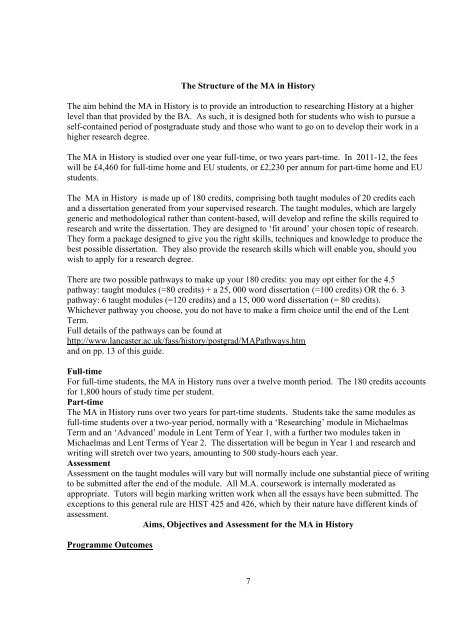M.A. in History Student Handbook 2011-2012
M.A. in History Student Handbook 2011-2012
M.A. in History Student Handbook 2011-2012
You also want an ePaper? Increase the reach of your titles
YUMPU automatically turns print PDFs into web optimized ePapers that Google loves.
The Structure of the MA <strong>in</strong> <strong>History</strong><br />
The aim beh<strong>in</strong>d the MA <strong>in</strong> <strong>History</strong> is to provide an <strong>in</strong>troduction to research<strong>in</strong>g <strong>History</strong> at a higher<br />
level than that provided by the BA. As such, it is designed both for students who wish to pursue a<br />
self-conta<strong>in</strong>ed period of postgraduate study and those who want to go on to develop their work <strong>in</strong> a<br />
higher research degree.<br />
The MA <strong>in</strong> <strong>History</strong> is studied over one year full-time, or two years part-time. In <strong>2011</strong>-12, the fees<br />
will be £4,460 for full-time home and EU students, or £2,230 per annum for part-time home and EU<br />
students.<br />
The MA <strong>in</strong> <strong>History</strong> is made up of 180 credits, compris<strong>in</strong>g both taught modules of 20 credits each<br />
and a dissertation generated from your supervised research. The taught modules, which are largely<br />
generic and methodological rather than content-based, will develop and ref<strong>in</strong>e the skills required to<br />
research and write the dissertation. They are designed to ‘fit around’ your chosen topic of research.<br />
They form a package designed to give you the right skills, techniques and knowledge to produce the<br />
best possible dissertation. They also provide the research skills which will enable you, should you<br />
wish to apply for a research degree.<br />
There are two possible pathways to make up your 180 credits: you may opt either for the 4.5<br />
pathway: taught modules (=80 credits) + a 25, 000 word dissertation (=100 credits) OR the 6. 3<br />
pathway: 6 taught modules (=120 credits) and a 15, 000 word dissertation (= 80 credits).<br />
Whichever pathway you choose, you do not have to make a firm choice until the end of the Lent<br />
Term.<br />
Full details of the pathways can be found at<br />
http://www.lancaster.ac.uk/fass/history/postgrad/MAPathways.htm<br />
and on pp. 13 of this guide.<br />
Full-time<br />
For full-time students, the MA <strong>in</strong> <strong>History</strong> runs over a twelve month period. The 180 credits accounts<br />
for 1,800 hours of study time per student.<br />
Part-time<br />
The MA <strong>in</strong> <strong>History</strong> runs over two years for part-time students. <strong>Student</strong>s take the same modules as<br />
full-time students over a two-year period, normally with a ‘Research<strong>in</strong>g’ module <strong>in</strong> Michaelmas<br />
Term and an ‘Advanced’ module <strong>in</strong> Lent Term of Year 1, with a further two modules taken <strong>in</strong><br />
Michaelmas and Lent Terms of Year 2. The dissertation will be begun <strong>in</strong> Year 1 and research and<br />
writ<strong>in</strong>g will stretch over two years, amount<strong>in</strong>g to 500 study-hours each year.<br />
Assessment<br />
Assessment on the taught modules will vary but will normally <strong>in</strong>clude one substantial piece of writ<strong>in</strong>g<br />
to be submitted after the end of the module. All M.A. coursework is <strong>in</strong>ternally moderated as<br />
appropriate. Tutors will beg<strong>in</strong> mark<strong>in</strong>g written work when all the essays have been submitted. The<br />
exceptions to this general rule are HIST 425 and 426, which by their nature have different k<strong>in</strong>ds of<br />
assessment.<br />
Aims, Objectives and Assessment for the MA <strong>in</strong> <strong>History</strong><br />
Programme Outcomes<br />
7
















